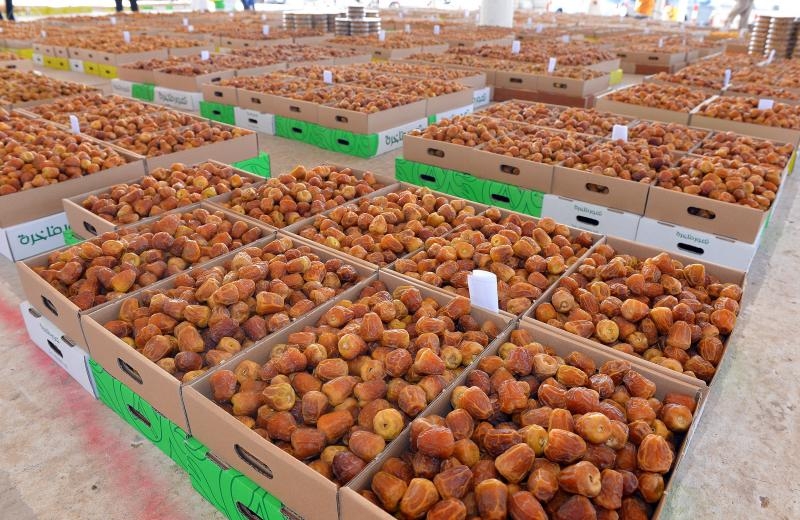Dates in Saudi Arabia
Dates in the Kingdom of Saudi Arabia are an agricultural crop and a national product intricately linked to the cultural heritage, customs, and traditions of hospitality and cuisine in the Kingdom. Agricultural areas dedicated to date production span across the Saudi map, encompassing packing and distribution factories, local and electronic sales outlets, as well as hosting annual date seasons and festivals.
Date varieties
The Kingdom produces more than three hundred types of dates, and its consumption among Saudis peaks during Ramadan, holidays, and various occasions. Moreover, the locals refer to the season when the dates are ripe as "Tabbakh al-Tamer" or "Tabbakh al-Rutab" (Date Cook).
Local production of dates
The Kingdom's domestic production of dates is estimated at 1.6 million t annually, with an annual per capita consumption estimated at about 35.1 kg. The Kingdom achieves 125 percent self-sufficiency in date crops.
There are over 34 million palm trees in the Kingdom, spread across all its regions. Qassim Province boasts 11.2 million palm trees, al-Madinah al-Munawwarah has 8.3 million, Riyadh 7.7 million, and the Eastern Province 4.1 million.
Dates exports
The Kingdom witnessed a significant increase in the export of dates and their derivatives in 2022, surpassing 321,000 tons valued at SAR1.28 billion. This marks a 5.4 percent increase from 2021 and a 121 percent surge from 2016 when exports amounted to SAR579 million, with a quantity of 134,000 t. These exports reached 116 countries worldwide.
The Kingdom's production of dates and their derivatives has seen substantial development and growth, employing modern technologies and maintaining high-quality standards. This has contributed to increasing the export of its products and has propelled the country to claim the top spot in date exports globally in 2021.

Types of dates
Khalas dates are among the leading varieties in the Kingdom in terms of production and export. Approximately 25 percent of the total palm trees in the Kingdom are Khalas-producing, with the largest share located in Riyadh Province, which alone encompasses around 3,200,668 Khalas-producing palm trees.
Other types of dates in the Kingdom are: Sukary, Barhi, Raziz, Ajwa, Saq'i, Safri, Shishi, Safawi, Khudari, Halawy, Anbara, Berni, and Rothana. The most preferred dates in the Kingdom are: Sukary, Khalas, and Ajwa, while the most exported types are: Khalas and Sukary.
Dates are sold in several forms: either as single fruits directly from the farm or farmer, or as packaged dates, processed dates, date paste, pressed dates, and dried dates.
Date industry
The date industry in the Kingdom falls within the scope of manufacturing industries, producing approximately twenty-five products, including: date paste, date molasses, date jam, date vinegar, date juice, baby food, medical solutions, and medical alcohol. Palm and date waste aids in the production of biofuel, ethanol, proteins, vitamins, organic fertilizer, pickles from dates, date powder, liquid sugar from dates, baking yeast from diluted date molasses, dried dates, date butter, oil extraction from pits, some hormones and antibiotics such as penicillin and eromycin, maamoul, date dough, and animal feed. Additionally, it contributes to the manufacture of home furniture, roofs, wicker baskets, brooms, and bags.
The National Center for Palms and Dates, established in 2011, is the official entity responsible for developing the date sector. It collaborates with the Ministry of Environment, Water, and Agriculture. In 2018, the center introduced the Saudi Dates Mark, a registered trademark for factories and farms, awarded to products meeting technical standards to ensure quality and compliance with global market requirements.
Establishment of the International Date Council
At the international level, the Kingdom supported the establishment of the International Dates Council due to the significance of the palm and dates sector and the necessity to enhance international cooperation in this field. The council was successfully established, and its inaugural meeting took place in al-Ahsa in February 2023, attended by several agricultural ministers and representatives from countries involved in dates production and importation worldwide. The Food and Agriculture Organization of the United Nations (FAO), the Arab Organization for Agricultural Development, the Arab Center for Studies of Arid Zones and Dry Lands (ACSAD), and the National Center for Palms and Dates were among the organizations involved.